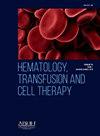Comparative evaluation of rapid plasma reagin and ELISA with Treponema pallidum hemagglutination assay for the detection of syphilis in blood donors: a single center experience
IF 1.8
Q3 HEMATOLOGY
引用次数: 0
Abstract
Introduction
The prime responsibility of blood transfusion services in India is to provide safe blood. The donated blood is tested for human immunodeficiency virus (HIV), hepatitis B virus (HBV), hepatitis C virus (HCV), malaria and syphilis. In India, the screening of donated blood for syphilis is performed by rapid plasma reagin (RPR) or venereal disease research laboratory (VDRL), whereas the World Health Organization (WHO) recommends screening of syphilis in blood donors by enzyme-linked immunosorbent assay (ELISA). Therefore, the aim of this study was to evaluate the performance of RPR and ELISA with the Treponema pallidum hemagglutination assay (TPHA – the gold standard) for the detection of syphilis in blood donors.
Methods
In this cross-sectional study, 1524 consecutive whole blood donors were screened from April to October 2022. All blood samples collected during the study period were tested by RPR, ELISA and the TPHA and the results obtained were compared.
Results
The seroprevalence of syphilis in blood donors in this study was 0.06% by RPR and 0.72% by ELISA and TPHA. On considering ELISA and the TPHA as the gold standard, ELISA had comparable sensitivity (100%), a higher specificity (100% vs. 99.34%), a higher positive predictive value (PPV - 100% vs. 9.1%) and no biological false positive/false negative results (0 vs. 10 false negatives) when compared to RPR.
Conclusion
ELISA performed better as a screening assay than RPR in the detection of syphilis in blood donors, which is in agreement with the WHO recommendations for syphilis testing in blood donors with low prevalence.
在检测献血者梅毒方面,快速血浆试剂和酶联免疫吸附试验与苍白螺旋体血凝试验的比较评估:一个单一中心的经验。
导言:在印度,输血服务的首要责任是提供安全的血液。对捐献的血液进行人体免疫缺陷病毒(HIV)、乙型肝炎病毒(HBV)、丙型肝炎病毒(HCV)、疟疾和梅毒检测。在印度,通过快速血浆试剂(RPR)或性病研究实验室(VDRL)对献血者进行梅毒筛查,而世界卫生组织(WHO)建议通过酶联免疫吸附试验(ELISA)对献血者进行梅毒筛查。因此,本研究旨在评估 RPR 和 ELISA 与苍白螺旋体血凝试验(TPHA--金标准)在检测献血者梅毒方面的性能:在这项横断面研究中,从2022年4月至10月对1524名连续的全血献血者进行了筛查。对研究期间采集的所有血样进行了 RPR、ELISA 和 TPHA 检测,并对检测结果进行了比较:本研究中献血者的梅毒血清阳性率(RPR)为 0.06%,ELISA 和 TPHA 为 0.72%。将 ELISA 和 TPHA 作为金标准时,与 RPR 相比,ELISA 的灵敏度(100%)、特异性(100% vs. 99.34%)、阳性预测值(PPV - 100% vs. 9.1%)更高,而且没有生物假阳性/假阴性结果(0 vs. 10 个假阴性):结论:ELISA作为一种筛查方法,在检测献血者梅毒方面的效果优于RPR,这与世界卫生组织(WHO)关于对低流行率献血者进行梅毒检测的建议一致。
本文章由计算机程序翻译,如有差异,请以英文原文为准。
求助全文
约1分钟内获得全文
求助全文
来源期刊

Hematology, Transfusion and Cell Therapy
Multiple-
CiteScore
2.40
自引率
4.80%
发文量
1419
审稿时长
30 weeks
 求助内容:
求助内容: 应助结果提醒方式:
应助结果提醒方式:


